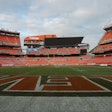|
Copyright 2013 Star Tribune All Rights Reserved Star Tribune (Minneapolis, MN) |
|
August 23, 2013 Friday
METRO EDITION |
|
NEWS; Pg. 1A
|
|
1652 words
|
| Wilfs await the price they must pay |
|
MIKE KASZUBA; STAFF WRITER, STAR TRIBUNE (Mpls.-St. Paul)
|
|
N.J. judge found Vikings owners guilty in a long and bitter lawsuit. Now she must decide their penalty - and worth. |
|
MORRISTOWN, N.J. - The latest drama over the Minnesota Vikings' new $975 million football stadium can be found in an unlikely setting - a 186-year-old courthouse in New Jersey with creaky floors, a weather vane atop its roof and a small fifth-floor courtroom littered with documents and charts. This is where Vikings owners Zygi and Mark Wilf have already been found guilty on civil charges of defrauding their partners over profits from a sprawling apartment complex that sits a short drive away. How much the Wilfs will have to pay in civil penalties, including punitive damages, is expected to be announced shortly, with a partial ruling possible as early as Friday. For years, the case dragged on in relative anonymity until two weeks ago, when the judge decided that the Wilfs showed "bad faith and evil motive" in a case she said was unlike any she had ever seen in New Jersey. Her words quickly caught the attention of Gov. Mark Dayton, who said he worried whether the judge's findings about the Wilfs' business practices would have any bearing on their stadium dealings. With ground about to be broken on the project and hard questions being raised over the Wilfs' credibility, officials in Minnesota ordered a review of the Vikings owners. The still-unfolding New Jersey case could be pivotal to the Minnesota review. Superior Court Judge Deanne Wilson is expected to rule soon on whether the Wilfs' net worth - which she will consider in awarding monetary damages - should be made public. While Zygi Wilf's net worth was at one point estimated at $310 million by Sports Illustrated, the court documents could provide a far more specific figure. This week, during an otherwise tedious discussion of management fees, there was a new glimpse of how far the Wilfs' real estate holdings stretch. Wilson said court documents showed the Wilfs had 30,000 to 50,000 apartment units, more than 100 other properties, two hotels - one of them in Israel - and a charter airline. And of course, she said, they own the Vikings. The suit, filed in 1992, has resulted in an estimated 1,600 separate court exhibits; the trial lasted 209 days; lawyers took court depositions from 56 people, and Zygi Wilf himself was on the witness stand for 33 days. The high stakes are reinforced just by estimates of the attorney fees - a lead lawyer has asked for at least $5.2 million. Most every day, Josef Halpern, who with co-plaintiff and sister Ada Reichmann want at least $50 million from the Wilfs, arrives in a motorized wheelchair accompanied by an attendant. Halpern sits to the side, wheezing and coughing as he struggles with ALS (Lou Gehrig's disease). His attorney, Alan Lebensfeld, said Halpern was ambulatory two years ago, but now is "getting worse by the day." Halpern smiles occasionally, but has difficulty speaking. Rachel Gardens, the disputed apartment complex, was named after Halpern's wife, Lebensfeld said. Halpern is "the one who found the property and brought it to" the Wilfs, the attorney added. Many of the case documents speak to an early history in which the Wilfs and the plaintiffs - and their families - were friendly business partners. Loaded language The Wilfs have not been in attendance recently to hear the judge list the reasons she thinks the Vikings owners committed fraud, breach of contract, breach of fiduciary duty and also violated New Jersey's civil racketeering laws. Zygi and Mark Wilf sat quietly in the courtroom in early August when Wilson, in comments that made headlines from New Jersey to Minnesota, said that Zygi Wilf's own testimony showed that he had "reneged" on the agreement with Reichmann because she got "too good a deal." For the most part, the Wilfs' courtroom lawyers have lately had little to say - including whether the Wilfs will appeal the judge's ruling. "I really can't go beyond [our] statement," said Wilf lawyer Shep Guryan. The Wilfs have been in business for 58 years, he said earlier, and "as with many businesses, disputes occasionally arise." Lester Bagley, the Vikings' vice president of public affairs and stadium development, said that the case will have "zero impact" on the Wilfs' ability to finance and operate the downtown Minneapolis stadium. Dayton said this week that he wants an "absolute, airtight guarantee'' that the Wilfs can meet their financial obligations with the stadium; the Vikings are responsible for $477 million of the construction costs, which includes a $200 million loan from the NFL and revenue generated from stadium naming rights, sponsorships and licensing fees. The setting hardly matches the high stakes. On most days, those gathered in Courtroom 16 are mostly lawyers. During a recess this week, one attorney jokingly asked Laurie Engemann, the court reporter who records every word spoken in the courtroom, if she was going to buy herself a diamond ring with earnings from the long-running case. With accountants for both sides also in the courtroom, most of the hearings have delved into the minutiae of the real estate deal gone bad. "Do we have to call it a 'scheme'?" Wilf lawyer Bruce Snyder interrupted, as a lawyer for Reichmann characterized the Wilfs' actions. At other points this week, the lawyers also squabbled in front of the judge over using the words "concocted" and "stealing" in describing the Wilfs' actions. "I think 'stealing' is not a word that I have used," the judge said. But an attorney for Reichmann argued that the case did involve a theft. "To me, 'stealing' and 'theft' is the same thing," he said. "This is not a criminal proceeding," the judge reminded him. Number crunching In a moment of levity, one of Wilf's lawyers confessed in the hallway Tuesday that cheering for the Vikings was not part of his job description. He was, he said, a Philadelphia Eagles fan. As the judge began her third week of discussing her decision, she focused at one point on the analysis of how much the Wilfs should have charged in management fees for Rachel Gardens. Wilson said that, given the Wilfs' numerous real estate holdings, she had doubts about how much time the Wilfs themselves had actually spent managing a 764-apartment complex. The case explored "how much time could the Wilfs spend on Rachel Gardens. [The] answer was, not much," she said. The judge had earlier said the Wilfs had charged "grossly disproportionate management fees." She said even assigning the Wilfs a "hypothetical" 5 percent in management fees presented a problem. In examining the records for Rachel Gardens, she explained, "there's not a single number" that showed that the Wilfs had charged a 5 percent management fee - in fact, some figures indicated that fees nearly eight times that amount were being charged. "I'm not allowing hypothetical [management] fees," she said finally. Millions at stake There have been some small victories for the Wilfs. For example, this week the judge exempted a period from 2002 to 2006 in which Reichmann could collect enhanced damages from the Wilfs. But an amended complaint filed in 2009 by Reichmann stretches for 72 pages, and details the animosity that now envelops the two sides. Reichmann's brothers, Abe and Josef Halpern, entered into the Rachel Gardens deal in the 1980s with Harry Wilf and Joseph Wilf, the father of Zygi and Mark Wilf. "From 1988 to the present, the [Wilfs] have engaged in a persistent and systematic pattern of fraudulent actions aimed at stealing as much money as possible" from the plaintiffs, the complaint asserted. The Wilfs, however, said the original partnership for Rachel Gardens was changed in 1988, and that a new legal entity - Pernwil Associates - was formed. The reason, according to the Wilfs: to exclude Abe Halpern from the partnership's management because they complained he had misappropriated money from other partnerships involving the Wilfs. Outside the courtroom this week, Josef Halpern said he had not talked to the Wilfs since 2006, and that they "threw me out of the building" in 2002. "Millionaires, billionaires - why are you doing this?" he said of the Wilfs. Halpern is quick to give the names of others, including his family members, whom he claims were also victimized by the Wilfs. For the judge, who plans to retire when the case ends, the trial pushes the envelope on almost a daily basis. Wilson admitted this week that she had found herself reading an 1894 legal case to try to help form her decision in the Wilfs' case. "There's just not a lot of law on some of these issues that have been brought up in this case," she said. Mike Kaszuba · 612-673-4388 THE WILF BUSINESS EMPIRE A lawsuit in a New Jersey court could offer the clearest view of Minnesota Vikings owner Zygi Wilf's holdings. Estimates of Wilf's net worth and the value of his family's residential and commercial real estate company have been sketchy because of the private nature of the family's Garden Homes and Garden Commercial Properties businesses. According to the company's websites: Garden Homes has built more than 25,000 homes in the past 40 years, and offers apartment rentals in Arizona, California, Florida, New Jersey, New York and Connecticut. Garden Commercial Properties owns and manages more than 25 million square feet of retail and commercial space, which according to the company's website ranks in the top 20 in the United States. Other estimates Sports Illustrated magazine in 2011 estimated Zygi Wilf's net worth at $310 million, 27th among 32 NFL team owners, not including the value of the team. Celebrity Net Worth, a gossip website, valued Zygi Wilf's total net worth at $1.3 billion. The publications and websites generally don't disclose how they determined those numbers. Zygi Wilf is also a movie buff, having co-funded several movies with his cousin, film producer Jonathan Schwartz. The movie site Fandango lists Wilf as executive producer on "Nobody Walks'' (2012), "Smashed'' (2012), "Like Crazy'' (2011), "Douchebag'' (2010) and "Spooner'' (2008). |
|
August 23, 2013
|
Terms and Conditions Privacy Policy



































